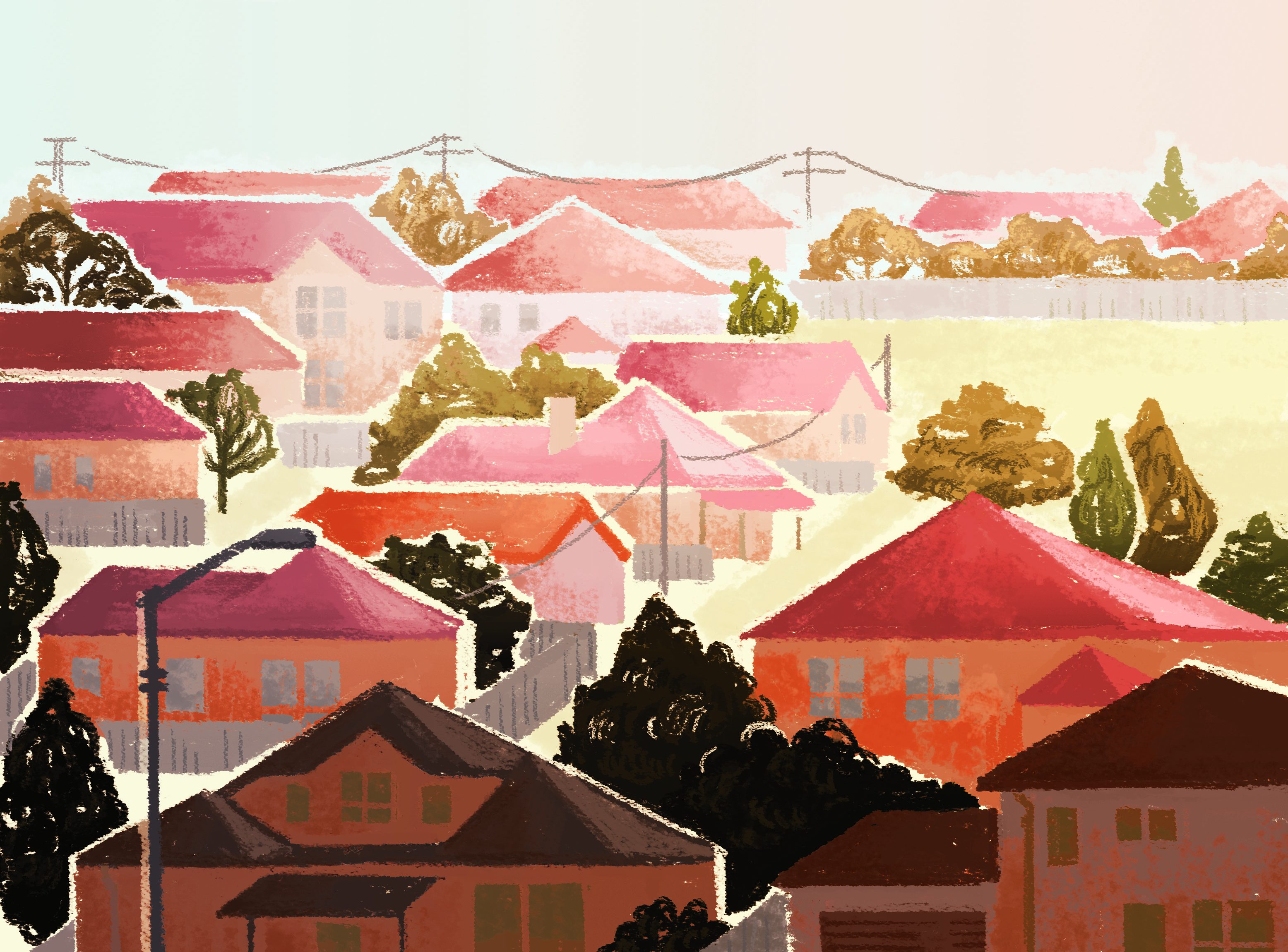By Sam Flynn
Illustration by Sarah Loo
When my friend was a child, his Grandma would take him on day trips to the city. On the drive, as they reached the start of the seemingly interminable suburbs of Melbourne, his Grandma would always sing the same song:
Little boxes on the hillside,
Little boxes made of ticky-tacky,
Little boxes on the hillside,
Little boxes all the same.
The song is Little Boxes by Malvina Reynolds. She wrote it while driving through a Californian suburb in 1962, perturbed by the sameness of the houses and their inhabitants.
I generally don’t like antipathy for the suburbs, and I think one commentator was quite justified in calling Little Boxes “the most sanctimonious song ever written.” But what I like about this story, and why I think it has stayed with me, is that Grandma wasn’t an inner city snob. She was from a humble little town in the flat, dry land outside of Shepparton. She was simply saying: I’m happy where I am.
Recently, it seems many have heard Grandma’s rendition of Little Boxes. For these people, settling down in the city isn’t enough. They are looking to greener pastures, and they seem to have found them in quiet country towns, just as Grandma did.
While escaping to the country is not a new phenomenon, in recent years the people doing so are younger and more creative than their predecessors. Young people are now far more likely to move to the country, and there has been a marked increase in creative migration to rural areas. The Castlemaine region, for example, saw a 1206% increase in creative migration in recent years.
When I began looking into this, I suspected, as many no doubt will, that these people are being pushed out of the city by its high cost of living. But, having spoken to two young creatives who have made the move, I think there may be a little more to it.
Chris, Horsham, Playwright
In some ways, Chris doesn’t quite fit the brief for this article. He didn’t choose to move to Horsham, a small town three and a half hours northwest of Melbourne. “I was like, fuck,” Chris said of the moment he was told he had to move.
At the time, he was a 26 year old Sydney-based playwright, an archetypal inner-city creative. The prospect of being so isolated filled him with trepidation. But, over the two years that Chris spent in Horsham, he found that very isolation to be invaluable to his writing.
It wasn’t just that he had time to write without the distractions of the city; it was also that he found there to be a connection between nature and his creativity. He would walk ten minutes from his house and find himself in large open fields, alone. “Do you talk to yourself when you write?” Chris asked me during the interview. Being in nature “gave me freedom, an entry point into that creative dialogue,” he said. While Chris didn’t know exactly what it was that inspired him, he stressed that he had to be away from people and buildings, from any marker of civilisation.
In 2015, Stanford University published a study which found that being in nature, rather than an urban space, significantly decrease one’s “rumination”, a psychological state in which one focuses repetitively and unhelpfully on one’s own distress. While I generally dislike pathologising human experience like this, reading this study I wondered whether this was the “freedom” Chris talked about; whether the silencing of destructive voices allowed him to create.
Maggie, Katherine, Fashion Entrepreneur
Last year, Maggie moved to Katherine in the Northern Territory with her girlfriend. Maggie has big white teeth and a big laugh, all tan skin and blonde hair. When she arrived, she worked for an Aboriginal legal service. But, she quickly realised something felt wrong. “When you’re a lawyer, you’re in this weird position of power,” she said. “I didn’t want to tell Aboriginal people what to do. I wanted to learn from them.” So, Maggie quit the law and started her own fashion label, Magpie Goose, collaborating with local Aboriginal artists.
Maggie is clearly inspired by working with Aboriginal communities, as she has done for years in both Darwin and Katherine: “you could spend a whole lifetime learning about just one community’s stories and culture.” But Maggie also recognised that there is something about being in the country, in and of itself, that allowed her to do this. She described the country as giving her a similar feeling of freedom as Chris: “it gives you the boldness to think that it’s possible.” Part of this, for Maggie, arose from the fact that she wasn’t surrounded by people doing the similar things.
When Maggie told me this, I was reminded of a line in Sartre’s play, No Exit: “hell is other people.” Sartre didn’t mean that other people were bad, necessarily. Rather, he meant that the presence of others disrupts the self. In a famous example, Sartre asks you to imagine that you are looking through a keyhole. You are completely engrossed, absorbed in whatever is happening on the other side. But, as you look through, you hear footsteps behind you.
Sartre thought that at the moment you become aware of the other person, you lose yourself. You forget whatever it was that engrossed you a moment before, and all you can see is what the other person sees: you. As he put it, we lose our own project, and become the project of the other. So too with Maggie, she feels as though the mere presence of others would force her to lose her own project, and to become theirs. “I never would have done this if I lived in the city,” she said.
“You can do anything out here.”


